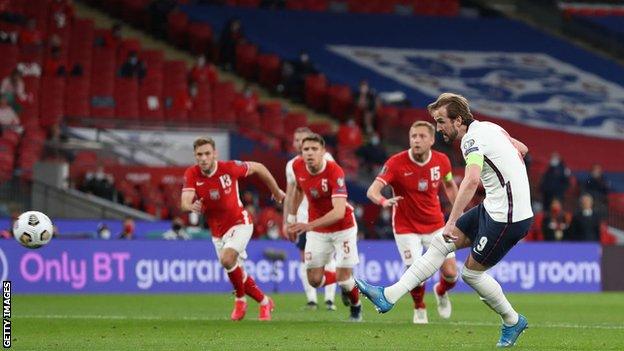Euro 2020: Broadcasters urged to suspend betting adverts during tournament
- Published

Advertising revenues are expected to soar during the Euros with the pandemic gradually easing in the UK
Broadcasters have been urged to suspend all betting adverts during the European Championship to protect those at risk of gambling-related harm.
A group of 60 gambling addicts, plus MPs and clinicians have written an open letter, external to broadcasters including ITV, Sky Sports, BT Sport and Talksport.
They say there is "overwhelming evidence" that advertising impacts on the likelihood of people betting.
ITV ran 172 gambling adverts during the 2018 World Cup.
That amounted to 17% of total adverts or more than 90 minutes of advertising, which was criticised, external after the tournament.
ITV said the number of gambling adverts during the Euros would be significantly reduced compared with the 2018 World Cup, while BT Sport said that because it would be showing no live matches, adverts of that nature would be less common.
The BBC and ITV will be broadcasting Euro 2020 in the UK with BBC Radio 5 Live and Talksport providing radio coverage.
The letter, signed by five MPs, comes after reports which say advertising spending is set to increase for big TV events this summer.
The letter states: "Unfortunately, we all know all too well how and where to put a bet on should we wish - suspending gambling advertising on TV would not affect this in the slightest.
"What it would do is protect those most at risk of suffering gambling-related harm. Indeed, a recent study found that 54% of those classified as 'problem gamblers' had spent money they hadn't previously intended on gambling during the lockdown as a result of advertising.
"The tournament has been a long time coming and after a tough time for the country, fans should be able to enjoy it without being on the end of gambling advertising, especially given the pressures of the pandemic.
"The last year has put the whole nation under significant strain, with anxiety, loneliness and financial insecurity all rising, and we strongly believe that these factors contribute to increased risk of suffering gambling harms."
A voluntary whistle-to-whistle gambling sponsorship ban exists for football matches shown on TV before the 9pm watershed, meaning adverts are not shown from five minutes before kick-off until five minutes after full-time.
Current rules would not stop pre-watershed adverts appearing between games during the delayed Euros, which runs from 11 June to 11 July, but ITV said the majority of the live matches it plans to broadcast would have no gambling adverts under the 'whistle-to-whistle' rules.
A gambling sponsorship ban is also being debated as part of the 2005 Gambling Act review, with results set to be announced in the autumn.
In response to the letter, ITV said it "certainly does not seek to minimise the impact of problem gambling and we have given substantial thought to how a government review could achieve the best outcomes for those at risk".
It added: "However, we do not believe that the balance of evidence supports your proposal that ITV should not accept any gambling advertising... in the small pockets of time left outside the pre-9pm whistle-to-whistle live ban.
"In our view this would be most unlikely to make a difference to problem gambling.... and would also have a direct impact on the sustainability of ITV's overall contribution to UK public service broadcasting, including free-to-air sport enjoyed by millions."
The number of problem gamblers in England is estimated at 280,000, according to a 2018 survey by NHS Digital, while a YouGov poll claimed there were up to 1.4 million across the UK in 2020.
In 2019, the Gambling Commission said that 55,000 children aged 11-16 had a gambling problem.
The letter added: "We are adamant that suspending gambling advertising during the tournament will prevent gambling harm, while not impinging on anyone's freedom to place a bet."
Sky Sports and Talksport have also been contacted for comment.

Snowfall is back: Hard-hitting drama about the crack epidemic in 1980s LA streaming now
How Gen Z is learning to adapt and thrive: Young entrepreneurs find new ways to make money in Covid times
